- Pershing Early Learning Programs
- Play at Pershing
Learning Through Play
-
 Scientific research over the past 30 years has taught us that the most important period of human development is from birth to eight years old. During these years, the development of cognitive skills, emotional well-being, social competence, and sound physical and mental health builds a strong foundation for success well into the adult years.
Scientific research over the past 30 years has taught us that the most important period of human development is from birth to eight years old. During these years, the development of cognitive skills, emotional well-being, social competence, and sound physical and mental health builds a strong foundation for success well into the adult years.Play is one of the most important ways in which young children gain essential knowledge and skills. Through play, children learn to forge connections with others, and to share, negotiate and resolve conflicts, as well as learn self-advocacy skills. Play also teaches children leadership as well as group skills. Furthermore, play is a natural tool that children can use to build their resilience and coping skills, as they learn to navigate relationships and deal with social challenges as well as conquer their fears.
In organized preschool settings, play experiences are enhanced when children are provided with ample time and space to engage freely. Play is considered children’s “work” and is the vehicle through which children acquire knowledge and skills, allowing children to engage independently and with others. The role of teachers and other adults in the room/environment is to enable and scaffold playful experiences and learning.
Source: UNICEF & The Lego Foundation "Learning Through Play"

